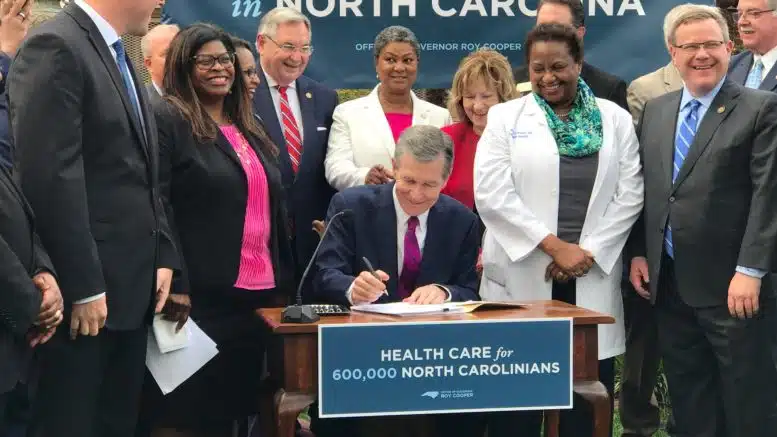By Jaymie Baxley
The N.C. Department of Health and Human Services hopes to accelerate the launch of Medicaid expansion, potentially giving more than 600,000 low-income residents access to health insurance coverage as early as Oct. 1.
In a news release on Wednesday, DHHS said it plans to begin expansion, which will increase the state’s long-standing income threshold for Medicaid, about three months earlier than originally expected. The expedited timeline, the agency said, is possible through a “compromise agreement” with the federal Centers for Medicare and Medicaid Services, which oversees the program.
Gov. Roy Cooper signed expansion into law this past March, but its implementation was tied to passage of a state budget by the General Assembly. All spring, it appeared that the legislature was on track for delivering a budget before the end of the state fiscal year on June 30.
But since the state Senate passed its version of the budget on May 18, negotiations between the Senate and state House of Representatives have stalled, delaying the budget and, with it, implementation. Officials have noted that means expansion-eligible North Carolinians can’t yet sign up for Medicaid.
It’s a hurdle that Kody Kinsley, the 38-year-old head of DHHS, believes his department can overcome by “de-coupling” expansion from the budget if the ongoing stalemate has not been resolved by the beginning of September. Still, he acknowledged that DHHS needs a “final thumbs-up” from lawmakers to move forward.
“I’ve talked to the General Assembly leadership about this strategy, and they’re supportive of us moving forward,” Kinsley said in an interview with NC Health News ahead of Wednesday’s announcement. “We’re going to do everything that we can in this bold move forward to be ready, and I hope that they’ll just turn the key whatever way they need to do it when we get up to that line.”
Increasing urgency
One major factor driving DHHS’ push to hasten expansion is the so-called “unwinding” of a federal provision that prevented states from kicking Medicaid participants off the rolls during the COVID-19 pandemic.
Because the federal government picks up the tab for more than two-thirds of North Carolina’s Medicaid bills, the state has to work with federal officials on managing the program, which covers more than a million and a half children in low-income families along with some of their parents, some low-income seniors and many people with disabilities.
Since the beginning of the coronavirus pandemic, people enrolled in Medicaid had been protected from losing coverage even if they no longer met their states’ eligibility requirements. That changed after the federal public health emergency ended and the national mandate was lifted on April 1 — just days after North Carolina passed legislation making it the 40th state to expand Medicaid.
The state now has less than nine months to verify the ongoing eligibility of more than 2 million Medicaid participants. An untold number of those enrollees are at risk of losing coverage because their income exceeds the current limit for North Carolina but is less than the maximum that would be allowed under expansion.
At least 9,000 expansion-eligible residents were disenrolled in June, according to Kinsley. He fears more people may fall into the same health insurance limbo as the unwinding continues.
“This is partly why we’re motivated to move so fast,” he said. “It’s not OK that 9,000 people were determined ineligible who would have been eligible under expansion. We want to try to get to that moment where those people can maintain care as soon as possible.”
Kinsley added that expansion is also urgently needed for uninsured people like DeAnna Brandon, a Rowan County resident diagnosed last year with a rare blood cancer. Brandon, 45, recently told NC Health News that the only chance she has to meaningfully extend her life is through an expensive stem cell transplant she cannot afford without health insurance.
Brandon would qualify for Medicaid under expansion, but the clock is ticking. The chemotherapy she receives to manage her cancer symptoms may eventually cause irreversible damage to her cells, undermining the effectiveness of a transplant.
“This is the only way for me to buy more time to spend with my friends and family,” she said.
Kinsley cited Brandon’s story as an example of the “personal impact that people are feeling” as they wait for expansion to take effect. “I think we all understand the pressure of getting these benefits into people’s hands as soon as possible,” he said.
Putting the pieces in place
The compromise reached with federal officials will allow DHHS to immediately begin sending public notices to Medicaid beneficiaries, health care providers and county agencies, a necessary precursor to expansion that, under the state’s previous rollout strategy, would not have been possible until a budget was enacted.
By notifying stakeholders now, DHHS can initiate the legally required process of soliciting comments from citizens and consulting with members of the Eastern Band of Cherokee Indians. The agency can also start training county and municipal social workers to handle the anticipated influx of newly eligible Medicaid enrollees.
Kinsley said these efforts will shorten the time needed to implement expansion, reducing what would have been a 120-day undertaking to about 30 days.
“Our drive here is simple: we want to maximize the benefit of this for North Carolina,” he said. “We also want to minimize the excess unnecessary spin and work that our county partners are going to have to do by not having enough time to plan. We didn’t want to jam them.”
If the budget impasse continues past Sept. 1 and lawmakers do not agree to carve expansion out of the state’s spending plan, all of the work that DHHS is doing will need to be redone, pushing the launch back to at least December. But Kinsley said state Senate leader Phil Berger (R-Eden) and House Speaker Tim Moore (R-Kings Mountain) have both indicated they would support the October rollout.
“Last week, I approached them and said, ‘Look, I don’t see this moving forward. I’m trying to figure out a way to help us keep moving. Are you comfortable with this?’ And they were,” Kinsley said. “I am grateful for their confidence in our team to technically deliver on this.”









